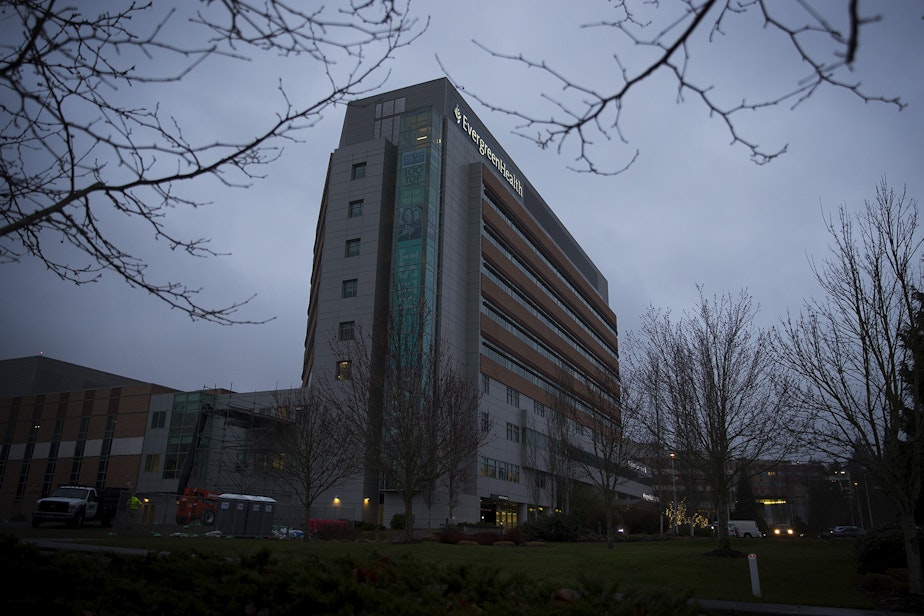Hospital at the center of U.S. coronavirus deaths hasn't been upfront about staff risk, nurses claim

Seven of the nine deaths attributed to Washington's coronavirus outbreak occurred at EvergreenHealth in Kirkland.
Employees of the hospital who cared for the deceased patients worry they were exposed to the coronavirus. But they claim EvergreenHealth hasn't been forthcoming about the level of risk to employees.
“We do have members who don’t have answers to some of their questions and we’re trying to support them and making sure they do get those answers, or at least they have resources that they can contact to get their questions answered,” said Sally Watkins, executive director of Washington state's nurses union.
Watkins added that nurses have also complained about a lack of proper equipment and poor communication at Overlake and Virginia Mason hospitals and Life Care Center, each of which have treated patients confirmed to have COVID-19.
“Based on information we have received, we have significant concerns about the potential exposure of this outbreak to our nurses,” states a newsletter the Washington State Nurses Association sent to members on February 29, the day the first known U.S. coronavirus death was publicly announced.
It was later discovered that two others had died of the disease on February 26.
“Nurses are reporting that there has been a lack of communication and specific guidance for those staff who were exposed to the known patients over the past days,” the newsletter continues.
Sponsored
The nurses union sent a list of questions to EvergreenHealth administrators, seeking information about the personal protective equipment and precautions in place at the time the affected patients were cared for. The union also requested a list of nurses who had been exposed to infected patients.
Another point of inquiry: “Will nurses have to use their PTO if furloughed, instructed to be on quarantine, or home ill due to potential exposure?”
The organization is requesting the same information of all hospitals that employ its members. Additionally, SEIU Healthcare 1199NW, which also represents health care workers, has made similar information requests, said executive vice-president Jane Hopkins.
One nurse at EvergreenHealth told KUOW she is worried after caring for a patient who she later learned through text messages had tested positive for COVID-19 and died.
The nurse, who requested not to be named for fear of retaliation, said her employer didn’t inform her of her exposure. But she said she’s sure "100 percent certain” she came into contact with the disease.
Sponsored
She said she was around the patient for approximately 15 minutes and was three or four feet away from the patient as she brought supplies to the patient’s room. She then transferred the patient to a new room and arranged some things there.
The nurse was wearing a mask, but the patient was not.
The Centers for Disease Control and Prevention's guidelines currently classify health care providers whose eyes, nose, or mouth were unprotected, and who experienced prolonged close contact with COVID-19 patients as “medium” risk and recommends they be excluded from work for 14 days.
“It is not possible to define the duration of time that constitutes a prolonged exposure,” according to the guidelines. “However, until more is known about transmission risks, it would be reasonable to consider anything longer than a brief (e.g., less than 1 to 2 minutes) exposure as prolonged.”
The EvergreenHealth nurse said she and her coworkers have repeatedly asked management for guidance about whether they should stay home, and they've been told to report to work if they weren’t experiencing symptoms such as fever, cough, and shortness of breath. The nurse reported to her shift as usual this week.
Sponsored
She added that she believes multiple coworkers who spent more time with the patient are at an even higher risk and should be quarantined.
“I don’t understand why Evergreen isn’t protecting their own staff,” she said.
Watkins with the Washington State Nurses Association described hearing points of concern from union members that echo ones raised by the EvergreenHealth nurse.
In a statement sent to KUOW, EvergreenHealth officials said, "we have been communicating with employees regularly about the protocols we’re following under the CDC’s guidance, and establishing systems for notifying all those potentially affected by the virus as quickly as possible."
The statement goes on to assert that "a first priority is directly contacting our employees who may have been in contact with patients who tested positive for COVID-19" and that the hospital is "in the process of sharing instructions with these employees for determining their personal risk."
Sponsored
Employees who meet the criteria for testing will be provided a drive-up testing site that is intended to minimize risk to others, according to the statement. Additionally, EvergreenHealth employees will receive compensation separate from sick time or paid time off should they need to be quarantined.




